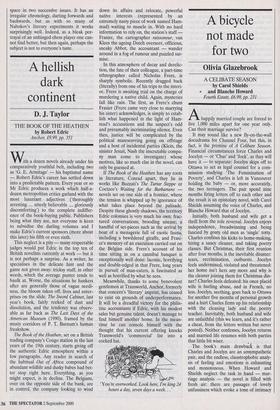A hellish dark continent
D. J. Taylor
THE BOOK OF THE HEATHEN by Robert Edric Anchor, f9.99, pp. 351 With a dozen novels already under his comparatively youthful belt, including two as 'G. E. Armitage' — his baptismal name — Robert Edric's career has settled down into a predictable pattern. Every year or so Mr Edric produces a work which half-a- dozen metropolitan critics garland with the most luxuriant adjectives (`thoroughly arresting ... utterly believable ... gloriously discomforting') to the complete indiffer- ence of the book-buying public. Publishers being what they are, not everyone is keen to subsidise the darling volumes and I make Edric's current sponsors (more about this later) his fifth or even sixth.
This neglect is a pity — many respectable judges would put Edric in the top ten of British novelists currently at work — but it is not perhaps a surprise. As a writer, he specialises in the delicate hint and the game not given away: tricksy stuff, in other words, which the average punter tends to baulk at. Worse, the situations he hankers after are generally those of vague seedi- ness, the bloom taken off, lives and enter- prises on the slide. The Sword Cabinet, last year's book, fairly reeked of dust and dissolution, and the tendency was observ- able as far back as The Last Days of the American Museum (1990), framed by the musty corridors of P. T. Barnum's human freakshow.
The Book of the Heathen, set on a British trading company's Congo station in the last years of the 19th century, starts giving off the authentic Edric atmosphere within a few paragraphs. Any reader in search of the habitual Out of Africa compound of abundant wildlife and dusky babes had bet- ter stop right here. Everything, as you might expect, is in decline. The Belgians, over on the opposite side of the bank, are in control, the company looking to wind down its affairs and relocate, powerful native interests (represented by an extremely nasty piece of work named Ham- mad) waiting to muscle in. With no hard information to rely on, the station's staff Frasier, the cartographer raissoneur, van Klees the ageing Dutch overseer, officious, sneaky Abbot, the accountant — wander around in a fog of rumour and puzzled sur- mise.
In this atmosphere of decay and derelic- tion, the fate of their colleague, a part-time ethnographer called Nicholas Frere, is sharply symbolic. Recently dragged back (literally) from one of his trips to the interi- or, Frere is awaiting trial on the charge of murdering a native child. Again, mysteries fall like rain. The first, as Frere's chum Frasier (Frere came very close to marrying his sister) acknowledges, is simply to estab- lish what happened in the light of Ham- mad's accusations and the suspect's odd and presumably incriminating silence. Even then, justice will be complicated by the political manoeuvring going on offstage and a host of incidental parties (Klein, the sinister Jesuit, Nash the inscrutable compa- ny man come to investigate) whose motives, like so much else in the novel, can only be guessed at.
If The Book of the Heathen has any roots in literature, Conrad apart, they lie in works like Buzzati's The Tartar Steppe or Coetzee's Waiting for the Barbarians novels set on one side of a frontier, where the tension is whipped up by ignorance of what takes place beyond the palisade. Despite these ghostly shadows, the territory Edric colonises is very much his own: frac- tured conversations; brooding unease; a handful of set-pieces such as the arrival by boat of a menagerie full of exotic fauna, including a bewildered giraffe, and Frasi- er's memory of an execution carried out on the Belgian side. Frere's account of his time sitting in on a cannibal banquet is exceptionally well done: laconic, horrifying and double-edged in that Frere, long years in pursuit of man-eaters, is fascinated as well as horrified by what he sees.
Meanwhile, thanks to some benevolent gentlemen at Transworld, Anchor, formerly that concern's 'literary' imprint, has ceased to exist on grounds of underperformance. It will be a dreadful victory for the philis- tine accountants if Edric, with his modest sales but genuine talent, doesn't manage to fmd himself another home. In the mean- time he can console himself with the thought that his current offering knocks Transworld's 'commercial' list into a cocked hat.
`You're overworked. Look here, I'm king 24 hours a day, seven days a week .


























































 Previous page
Previous page